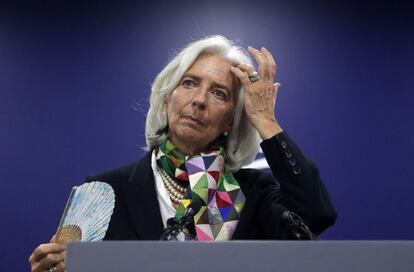IMF highlights solvency of Spanish banks after restructuring
But troika members express concern about sustainable earnings

The IMF’s managing director, Christine Lagarde, on Thursday had some reassuring words to say about the solvency of the Spanish banking system after restructuring. But IMF, European Central Bank and European Commission officials, in Madrid to check on Spain’s compliance with the bailout program for the sector, fretted about lenders’ weak profitability.
“The Spanish authorities have done a good job recapitalizing and restructuring so that the banking sector is solid and healthy,” Lagarde told reporters during a visit to Seoul.
However, she pointed out that Spanish banks along with other European lenders still have to pass the asset quality and stress tests to which they will be subject next year.
In the meetings inspectors from the troika have held with the Bank of Spain and the Treasury since they arrived in Madrid on Monday, the focus of interest has not been so much the issue of banks’ capital levels and provisions, but the issue of recurring earnings (as opposed to one-off profits), financial margins and the prospects for these looking ahead.
They argued that rather than getting involved in a struggle to attract deposits, banks should look for reasonably priced sources of funding and put a lid on what they charge for loans, while controlling general costs.
Banks have attributed weak lending to a lack of “solvent demand” with the economy just emerging from an extended recession and the recovery yet to take hold. However, the European Commission has also noted “supply” problems, with small-to-medium sized enterprises finding it hard to secure loans at reasonable borrowing costs.
“Next year is going to be very hard,” said a local bank executive, who asked not to be named. “Worse than this year, particularly for those whose business is restricted to Spain. The concerns of the troika are reasonable.”
Banks’ earnings this year have been boosted by one-off gains from the sale of assets. Troika officials also noted that domestic banks had benefitted from borrowing at very low rates from the ECB to buy much higher-yielding Spanish public debt. However, the financial margin of the sector, a reflection of the state of play of recurring earnings, has fallen to around 11 percent.
The ECB’s decision to cut its key lending rate to a record low of 0.25 percent will also reduce bank revenues from loans, particularly home mortgages. The vast majority of the some 582 billion euros in outstanding home loans granted by banks have rates pegged to the one-year Euribor rate, which in turn is dependent on the ECB’s key intervention rate. The Euribor is expected to fall to around 0.30 percent from 0.50 percent.
Bank earnings will also be hit by volumes of outstanding loans. According to Bank of Spain figures, credit to households in October fell by a record 4.7 percent from the previous month to 793.940 billion euros. Lending to companies fell 10 percent in October to 1.081 trillion euros. In both cases, outstanding credit is at levels last seen in 2007.
Tu suscripción se está usando en otro dispositivo
¿Quieres añadir otro usuario a tu suscripción?
Si continúas leyendo en este dispositivo, no se podrá leer en el otro.
FlechaTu suscripción se está usando en otro dispositivo y solo puedes acceder a EL PAÍS desde un dispositivo a la vez.
Si quieres compartir tu cuenta, cambia tu suscripción a la modalidad Premium, así podrás añadir otro usuario. Cada uno accederá con su propia cuenta de email, lo que os permitirá personalizar vuestra experiencia en EL PAÍS.
¿Tienes una suscripción de empresa? Accede aquí para contratar más cuentas.
En el caso de no saber quién está usando tu cuenta, te recomendamos cambiar tu contraseña aquí.
Si decides continuar compartiendo tu cuenta, este mensaje se mostrará en tu dispositivo y en el de la otra persona que está usando tu cuenta de forma indefinida, afectando a tu experiencia de lectura. Puedes consultar aquí los términos y condiciones de la suscripción digital.








































